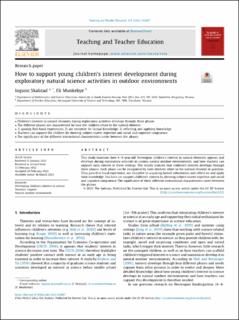How to support young children's interest development during exploratory natural science activities in outdoor environments
Peer reviewed, Journal article
Published version
Permanent lenke
https://hdl.handle.net/11250/3059699Utgivelsesdato
2022Metadata
Vis full innførselSamlinger
- Institutt for lærerutdanning [3411]
- Publikasjoner fra CRIStin - NTNU [37304]
Originalversjon
Teaching and Teacher Education : An International Journal of Research and Studies. 2022, 114 1-14. 10.1016/j.tate.2022.103687Sammendrag
This study examines how 4–8-year-old Norwegian children's interest in natural elements appears and develops during exploratory activities in various natural outdoor environments, and how teachers can support such interest in these settings. The results indicate that children's interest develops through three phases. Each phase can be recognised by how children relate to the natural element in question. They gain first-hand experience, are receptive to acquiring factual information and reflect on and apply their knowledge. Teachers can support children's interest by showing subject matter expertise and social and cognitive congruence. The significance of these different interactional characteristics varies between the phases.

